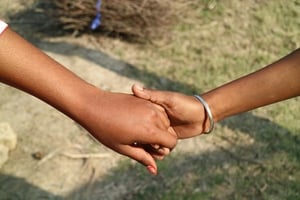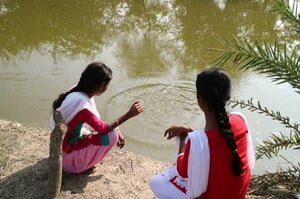
Kumari* is 15 and studies in the 10th grade. She is part of a World Vision ‘Girl Power Group’ where she learned how to protect herself from abuse. She was taught three steps: she must scream, she must get away, and she must report the incident to people she trusts…immediately. Unfortunately, she had to use what she learned in real life.
She was walking alone to a study group when a man from her street stopped her. It was dark with no streetlights. The man started speaking in a lewd manner and proposed that she take part in a sexual act.
When she refused and continued to go her way, he grabbed her. When the abuse began, Kumari screamed and the startled man let her go. She ran. Next, she told her parents what happened, just like she was supposed to.
When Kumari and her parents went to the police station to take her statement, the police refused to give them a copy of the complaint. The family was hoping the perpetrator would be arrested, but there he was, still in their community. They were very confused, and when they tried to follow up with the police, they were threatened. In one such follow-up visit, the police said something very strange to Kumari’s father. He said, “Don’t involve World Vision in this case.”
There is a reason the police made that comment. In a bid to prevent trafficking and sexual violence in these vulnerable communities, World Vision has created an anti-trafficking network with like-minded organizations, government officials and some police. This is a first in the region and collectively, they are fighting this issue. Within the network, expertise is shared and loopholes in the law are exposed, leading to more perpetrators being arrested.
 Kumari told her friend Shivli and the others in the Girl Power Group, “I want justice.” Shivli, the leader of Rupali Girl Power Group, told Rajkumar, a World Vision Child Protection officer, about what happened. “We are not able to do anything about this because there is enormous pressure on the family,” says Shivli. But Shivli’s actions did do something. Rajkumar approached the police for a copy of the complaint. The police made excuses (the internet was not working…the printer ran out of ink) and didn’t provide one. Using contacts through the anti-trafficking network, World Vision got in touch with senior police officials who pressured the local police station. Finally, they released a copy.
Kumari told her friend Shivli and the others in the Girl Power Group, “I want justice.” Shivli, the leader of Rupali Girl Power Group, told Rajkumar, a World Vision Child Protection officer, about what happened. “We are not able to do anything about this because there is enormous pressure on the family,” says Shivli. But Shivli’s actions did do something. Rajkumar approached the police for a copy of the complaint. The police made excuses (the internet was not working…the printer ran out of ink) and didn’t provide one. Using contacts through the anti-trafficking network, World Vision got in touch with senior police officials who pressured the local police station. Finally, they released a copy.
Rajkumar noticed many discrepancies in the complaint. For instance, the complaint only contained Kumari’s words about ‘touching’ and nothing about the sexual violence. Rajkumar accompanied Kumari as she testified to the magistrate to correct this. In turn, the magistrate pressed the local police about the difference in the girl’s statement and the complaint. If World Vision had not helped, this case would have been lost. The link between corrupt lawyers, local politicians and the police is very strong - they are paid money by the sex offenders and traffickers if they help them.
The incident embarrassed the local police who apologized to the magistrate and a more serious case was filed against the perpetrator. This new case was a non-bailable offense. It truly ‘takes a village’ to stop the ripple effect of trafficking and abuse. By creating the anti-trafficking network, World Vision is cleaning up the system, ensuring that girls like Kumari get the justice they deserve.
*Alias







